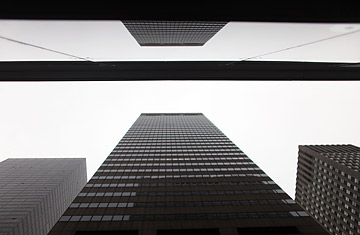
The Piaget Building at 650 5th Avenue, New York City
Managers of an Iranian charity started by the Shah faced a dilemma with its American properties, as Washington tightened a squeeze on all entities tied to the Islamic Revolutionary Government. But U.S. law allowed a simple solution for the renamed Alavi Foundation: disguise its properties' real owners through the use of shell companies, multiple ones if need be.
So, its 36-story skyscraper in midtown Manhattan, registered as the 650 Fifth Avenue Company, was owned by Assa Corporation, a New York shell company, which listed its owner as Assa Company Ltd., a Jersey, Channel Islands entity. In most cases that's as far as investigators get — but here authorities were eventually able to determine that Assa was in fact entirely owned by the state-owned Bank Melli, which is banned in the U.S. for supporting Tehran's nuclear program.
Exposing this entirely legal labyrinth of ownership took years of interagency pick-and-ax work. In the end it demonstrated how nefarious activity — even as high profile as this — can go on for years, right under authorities' noses. It's also meant that tenants of the prestigious Manhattan property have been paying millions in rent to Tehran every year — $4.5 million in 2007 alone. Last November, more than 30 years after the Islamic revolution, U.S. officials moved to take over all of Alavi's U.S. properties and bank accounts, spread over five states.
Officials say "countless investigations" end with the outlaws disappearing down these perfectly legal rabbit holes — and it's a growing frustration. All criminals need to launder their illicit earnings, and our lax incorporation requirements make the U.S. a highly attractive domicile. Only two states, Alabama and Alaska, bother to ask the names of the real owners. After incorporation, these anonymous companies can open U.S. bank or brokerage accounts, or obtain credit cards, all of which lend some U.S. legitimacy — the better to evade scrutiny or entrap more victims. In fact, the U.S. just might be the world's biggest washing machine for dirty money.
Officials admit they do not have a handle on the full scope of the problem (a 1996 estimate from the International Monetary Fund said money-laundering accounts for 2%-5% of global GDP) but it's certainly many billions every year.
Other notable users of U.S. shell companies: Viktor Bout, the notorious Russian arms trafficker; the Sinaloa drug-trafficking cartel; and Semion Mogilevich, the "brainy don" of Russian mafia dons, recently named on the FBI's Ten Most Wanted Fugitives List. "Each of these examples involves the relatively rare instance in which law enforcement identified the perpetrator misusing the U.S. shell companies," senior Justice Department official, Jennifer Shasky, told a Senate panel recently. Added a senior Treasury official before the same hearing of the Senate Homeland Security and Governmental Affairs Committee: "Years of research and law-enforcement investigations have conclusively demonstrated the link between the abuse of legal entities, on the one hand, and, on the other hand, WMD proliferation, terrorist financing, sanctions evasion, tax evasion, corruption and money-laundering for virtually all forms of serious criminal activity."
But for all the ills these shell companies facilitate, it's getting easier and easier to open one. That's because it's big business and states compete at offering ever more secure anonymity along with other benefits. Delaware is the well-known leader. The state recently won the dubious top rank in a new Financial Secrecy Index, for the aggressive secrecy and dollar volume it handles, outdoing Switzerland, the Cayman Islands and Panama.
